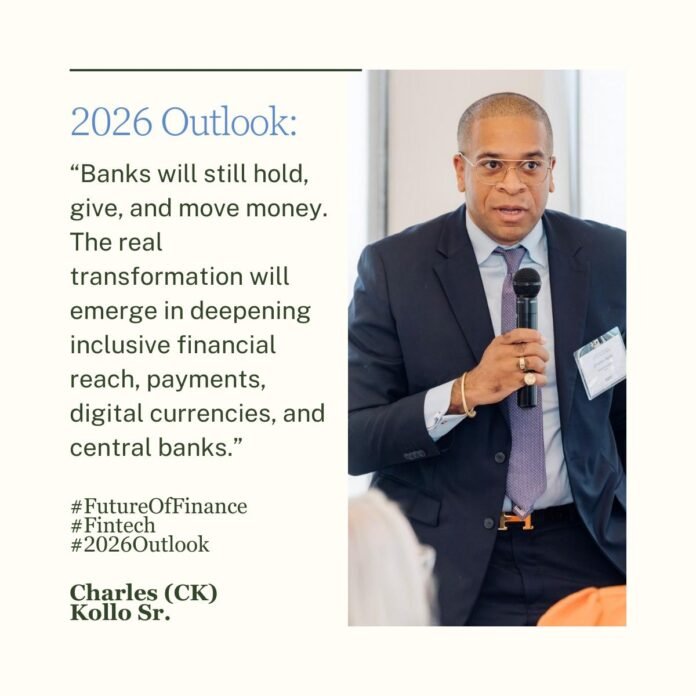By Charles Kollo (CK) Snr, President/Co-Founder – Global African Times Magazine & Media
We are entering a period where it is important to take an industry check and return to fundamentals. At their core, banks perform three essential functions: holding money, giving money through loans, and facilitating the movement of money through payments and transactions.
Everything else, from grants and loans to tax incentives and service revenues, builds on these pillars.
Looking ahead to 2026:
• The holding of deposits will remain highly regulated.
• Lending can be reimagined as new sources of capital emerge, spreading risk across local, regional, and international financial partners.
• Payments represent the greatest opportunity, with rapid innovation driven by digital adoption and a widening push to deepen inclusive financial reach.
The financial services industry is one of the last major sectors ripe for full transformation. Over the next five years, we will see new rules, new players, and significant shifts in areas such as inclusive access to finance, payment facilitation, alternatives to fiat, digital currencies, and the evolving role of central banks.
In 2026, finance will be shaped by the increased integration of AI, block chain, and other technologies, leading to greater efficiency and security through advanced authentication and AI-driven fraud detection. We should expect continued growth in Decentralized Finance (DeFi) and Open Finance, along with a greater focus on sustainability, ethical practices, and compliance with evolving regulations. Digital payment innovations will drive cross-border business expansion and greater financial inclusion, though the industry will also grapple with cybersecurity challenges and economic uncertainty.
Some of the transformations and evolutions to expect would include:
- DeFi Expansion: Decentralized Finance will move towards mainstream integration, allowing for borrowing, lending, and trading of assets without traditional institutions.
- AI and Automation: Artificial intelligence will enhance efficiency in accounting processes and streamline operations, while AI-driven security systems will be crucial for detecting and preventing fraud.
- Open Finance: The Open Finance movement will gain momentum, relying on shared data infrastructures and collaborative efforts to drive innovation and value across the financial ecosystem.
- Digital Payments: Evolving payment platforms, including instant payments, “Buy Now, Pay Later,” and ‘stable coins’, will become more prevalent, fostering new markets and increasing financial inclusion.
Ethical Banking
A demand for greater transparency and accountability will drive more ethical banking practices, emphasizing fair lending and responsible investments.
Advanced Security
Financial institutions will deploy advanced security measures such as biometric authentication and encryption to protect against increasing cyber threats.
Stricter Compliance
Stricter data protection and privacy regulations will be implemented, requiring institutions to ensure their practices meet regulatory standards and protect customer data.
Possible Market & Business Trends
Cross-Border Integration: Digital platforms and innovative financing models will promote cross-border trade, enabling SMEs to participate more easily in international markets.
Economic Uncertainty: Navigating economic uncertainty will be a significant challenge, requiring institutions to invest strategically in technology and automation to enhance their resilience
The Future of Traditional Banks from Year 2026 on…
A new report from PwC suggests that, by as soon as 2025 – 2030, a market economy could readily exist without banks of the traditional kind. The report, The Future Shape of Banking, says that as barriers to entry for non-banks to provide formerly ‘core’ banking services continues to decline, the business models of today’s banks will be challenged. However, banks retain some substantial advantages to help them prevent this from happening: banks’ brands and reputations remain powerful, shored up by familiarity, experience and regulation. Trust and brand matter in financial transactions and some of the resistance to alternative banking providers results from a lack of trust in their security. Trust and brand matter in financial transactions and some of the resistance to alternative banking providers results from a lack of trust in their security.
“Banks still have advantages and alternative providers suffer from a lack of trust; but to be part of the future, banks need to invest heavily, rediscover and reassert their core role in society, and secure the ongoing support of policymakers.”
It is also posited that 2026 is going to be AI’s big year in the finance department. A new study from AI-powered procurement software company Tropic found that half of finance departments are currently piloting AI solutions, but 86% plan on using it in much fuller force by 2026. And they aren’t just doing it because of the competitive pressure from other companies embracing AI. Two-thirds said their top driver in AI adoption is its operational efficiency.
Most companies aren’t yet seeing the expected efficiency boost, but it’s slowly getting there. Just over half of companies say they’re only seeing a slight improvement in productivity from AI, though that may also be because they’re running smaller-scale pilot projects. And when asked what business-level outcomes finance leaders are seeing from AI, the most common answer—from 43%—was that there’s no measurable impact yet. However, the rest of the respondents are seeing positives, with 30% reporting cost savings and 20% reporting better forecasting and planning.
What do you think will be the next major shift in financial services in the next year?
The Author, Charles Kollo, often known as CK, is a dynamic leader in the fields of financial innovation and cultural heritage. As a Head of Innovation and a Fintech visionary, CK has dedicated his career to building inclusive, technology-driven financial solutions that empower underserved communities. His work spans creating accessible financial ecosystems and advising both companies and governments on navigating African markets with sustainable, forward-looking strategies.
Beyond his Fintech expertise, CK is a passionate storyteller and the author of “Among Gold and Cowries,” a book that explores the historical roots of African wealth and its relevance to the modern world. Through his writing, he aims to connect heritage with contemporary economic narratives, inspiring the global African diaspora and beyond.
In every endeavor, CK blends a deep respect for cultural legacy with a forward-looking vision, making him a unique voice in both the financial and creative worlds.
Additional Source: PwC Nigeria,




